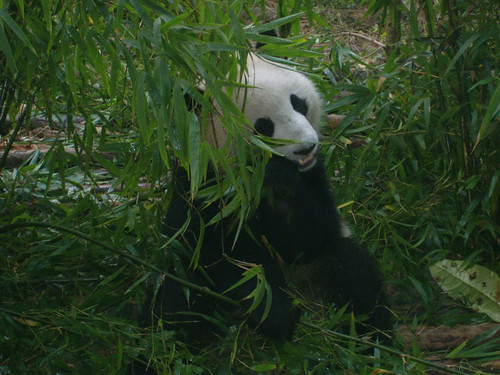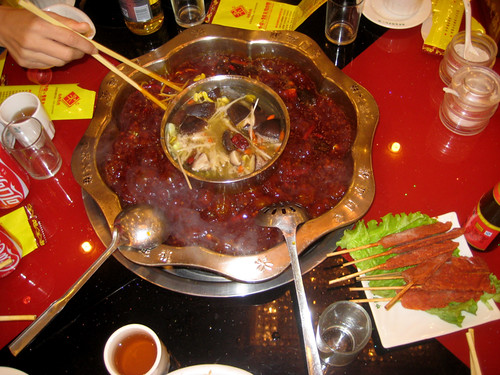Our train arrived in Chengdu around 5:30 AM and we grabbed breakfast and went straight to the Pandas to catch them during their breakfast. Their main activities apparently include eating, sleeping, and playing. What a life!
So there are only about 1,000 pandas left in the entire world, and we had the great privilege of hanging out with about 15 of them today. They are the most lovable creatures I have ever seen. Surprisingly graceful for such stocky animals, I could have sat for hours just watching them roll around and munch on bamboo. The reserve is really huge and is meant to imitate the pandas' natural habitat, except for the wooden structures for the young ones to play on. My motherly instincts definitely came out watching them climb around. I just wanted to jump in there and play along! Nothing, however, compared on the adorability scale to the nursery where the tiny baby pandas were cared for until they grew big enough to join the rest of the group. These bears were roughly the size of human babies and looked like giant cotton balls with two little back eyes. Seriously, you have not seen cute 'til you've seen this.
It was hard to say goodbye to the pandas, but we moved on to yet another one-of-a-kind experience: a vegetarian banquet in the Wenshu Buddhist Temple. Seth and I have had lots of tofu and gluten-based veggie "meat" before, but nothing could compare to this. We were brought dish after colorful dish of every type you can image--sausage, Shepard's pie, sweet & sour pork, even squid with little tentacles--all strictly vegetarian! And the best part is that it was absolutely delicious. Each dish had its own incredible flavor and texture and sauce and vegetables prepared in every which way. Our table filled with serious carnivores all agreed that it was one of the best meals they'd had in China.
Feeling satisfied in our tummies, we still needed to satisfy our souls, and strolling around the magnificent temple gardens did just the trick. Stone pathways lined with natural rock sculptures, picturesque gazebos and ginkgo biloba trees led the way to the main temple courtyard, where worshippers were lighting incense and praying to larger than life statues of Buddha and various dieties. The smoke from the incense lent a haze to the air, making the scene seem even more magical.
***LATER THAT NIGHT***
A much-needed afternoon rest ensued, and before we knew it, it was time to eat again. We must have taken our cues from the pandas today! Our dinner was "hot pot," a Sichuan specialty and one of the craziest meals I've ever had. Think about a large fondue pot with handfuls of chili peppers, coriander seeds, and fish heads--yes, fish heads--floating in the spicy oil. Then, picture dumping all sorts of mysterious foodstuffs into it, like hard-boiled quail eggs, bamboo, meat dumplings, beef skewers (skewer included), and lotus root and swishing it around for a while. Finally, you plunge your chopsticks into the dark brew and fish around (no pun intended) for some of those items--now cooked, slippery, and damned hard to grab--and pluck them out to dip them into a garlic infused oil and finally into your mouth. When we ordered noodles to help balance out the strong flavors, a guy came by with some dough and made us one long, flat noodle that went right into the pot to cook, too, and then we had to find it with our chopsticks and break off our own portion. I don't think I've ever worked quite so hard for dinner!
After dinner, we checked out a performance of the Sichuan Opera, which was really more of a vaudeville show than an opera. I was pleased about that since most actual Chinese opera sounds like a late night turf fight between warring gangs of kitty cats. The show consisted of several acts where elaborately-costumed performers played traditional instruments, did shadow puppets, acted out comedic skits, and did physical feats like fire breathing and lying on their backs juggling large objects like coffee tables with their feet. There was something sort of old-timey and sad about the show and I was glad to witness what felt like a dying art in this ever-modernizing country.



No comments:
Post a Comment